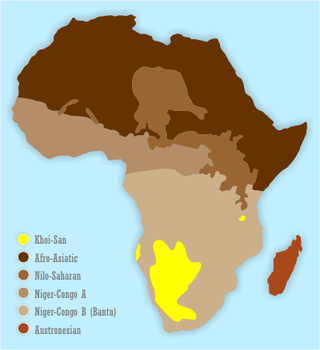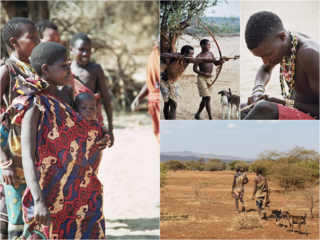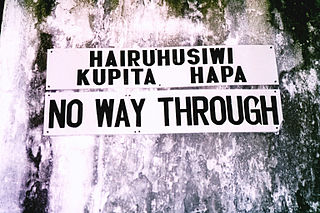Hadza may refer to:
- Hadza people, or Hadzabe, a hunter-gatherer people of Tanzania
- Hadza language, the isolate language spoken by the Hadza people
Hadza may refer to:
Click consonants, or clicks, are speech sounds that occur as consonants in many languages of Southern Africa and in three languages of East Africa. Examples familiar to English-speakers are the tut-tut or tsk! tsk! used to express disapproval or pity, the tchick! used to spur on a horse, and the clip-clop! sound children make with their tongue to imitate a horse trotting.

The Khoisan languages are a number of African languages once classified together, originally by Joseph Greenberg. Khoisan is defined as those languages that have click consonants and do not belong to other African language families. For much of the 20th century, they were thought to be genealogically related to each other, but this is no longer accepted. They are now held to comprise three distinct language families and two language isolates.
In phonetics, ejective consonants are usually voiceless consonants that are pronounced with a glottalic egressive airstream. In the phonology of a particular language, ejectives may contrast with aspirated, voiced and tenuis consonants. Some languages have glottalized sonorants with creaky voice that pattern with ejectives phonologically, and other languages have ejectives that pattern with implosives, which has led to phonologists positing a phonological class of glottalic consonants, which includes ejectives.
The alveolar and dental ejective stops are types of consonantal sound, usually described as voiceless, that are pronounced with a glottalic egressive airstream. In the International Phonetic Alphabet, ejectives are indicated with a "modifier letter apostrophe" ⟨ʼ⟩, as in this article. A reversed apostrophe is sometimes used to represent light aspiration, as in Armenian linguistics ⟨p‘ t‘ k‘⟩; this usage is obsolete in the IPA. In other transcription traditions, the apostrophe represents palatalization: ⟨pʼ⟩ = IPA ⟨pʲ⟩. In some Americanist traditions, an apostrophe indicates weak ejection and an exclamation mark strong ejection: ⟨k̓, k!⟩. In the IPA, the distinction might be written ⟨kʼ, kʼʼ⟩, but it seems that no language distinguishes degrees of ejection.
The bilabial clicks are a family of click consonants that sound like a smack of the lips. They are found as phonemes only in the small Tuu language family, in the ǂ’Amkoe language of Botswana, and in the extinct Damin ritual jargon of Australia. However, bilabial clicks are found paralinguistically for a kiss in various languages, including integrated into a greeting in the Hadza language of Tanzania, and as allophones of labial–velar stops in some West African languages, as of /mw/ in some of the languages neighboring Shona, such as Ndau and Tonga.

Sandawe is a language spoken by about 60,000 Sandawe people in the Dodoma Region of Tanzania. Sandawe's use of click consonants, a rare feature shared with only two other languages of East Africa – Hadza and Dahalo, had been the basis of its classification as a member of the defunct Khoisan family of Southern Africa since Albert Drexel in the 1920s. Recent investigations however suggest that Sandawe may be related to the Khoe family regardless of the validity of Khoisan as a whole. A discussion of Sandawe's linguistic classification can be found in Sands (1998).

Hadza is a language isolate spoken along the shores of Lake Eyasi in Tanzania by around 1,000 Hadza people, who include in their number the last full-time hunter-gatherers in Africa. It is one of only three languages in East Africa with click consonants. Despite the small number of speakers, language use is vigorous, with most children learning it, but UNESCO categorizes the language as vulnerable.
A band society, sometimes called a camp, or in older usage, a horde, is the simplest form of human society. A band generally consists of a small kin group, no larger than an extended family or clan. The general consensus of modern anthropology sees the average number of members of a social band at the simplest level of foraging societies with generally a maximum size of 30 to 50 people.
HTS may refer to:
Dahalo is an endangered Cushitic language spoken by at most 400 Dahalo people on the coast of Kenya, near the mouth of the Tana River. Dahalo is unusual among the world's languages in using all four airstream mechanisms found in human language - clicks, implosives, ejectives, and regular consonants.

The Sandawe are an indigenous ethnic group of Southeast Africa, based in the Chemba District of Dodoma Region in central Tanzania. In 2000, the Sandawe population was estimated to be 40,000.

The Hadza, or Hadzabe, are a Tanzanian indigenous ethnic group mostly based in southwest Karatu District of Arusha Region. They live around Lake Eyasi in the central Rift Valley and in the neighboring Serengeti Plateau. There are, as of 2015, between 1,200 and 1,300 Hadza people living in Tanzania, however only around 400 Hadza still survive exclusively based on the traditional means of foraging. Additionally, the increasing impact of tourism and encroaching pastoralists pose serious threats to the continuation of their traditional way of life.
Kwʼadza (Qwadza), or Ngomvia, is an extinct Afroasiatic language formerly spoken in Tanzania in the Mbulu District. The last speaker died sometime between 1976 and 1999.
The voiceless palatal lateral affricate is a type of consonantal sound, used in some spoken languages. There are two ways it can be represented: either extIPA ⟨c͜𝼆⟩ or strict IPA ⟨c͜ʎ̥˔⟩.
The voiceless velar lateral affricate is a relatively uncommon speech sound found as a phoneme in the Caucasus and as an allophone in several languages of eastern and southern Africa. In strict IPA, it needs to be transcribed with diacritics, but a proper letter exists in extIPA: ⟨k𝼄⟩.
The palatal lateral ejective affricate is a rare type of consonantal sound, used in some spoken languages. The symbol in the International Phonetic Alphabet that represents this sound is ⟨c͜𝼆ʼ⟩.

Tanzania is a multilingual country. There are many languages spoken in the country, but no one language is spoken natively by a majority or a large plurality of the population. Swahili and English, the latter of which was inherited from colonial rule, are widely spoken as lingua francas. They serve as working languages in the country, with Swahili being the official national language. There are more speakers of Swahili than of English in Tanzania.
NGQ or ngq may refer to: